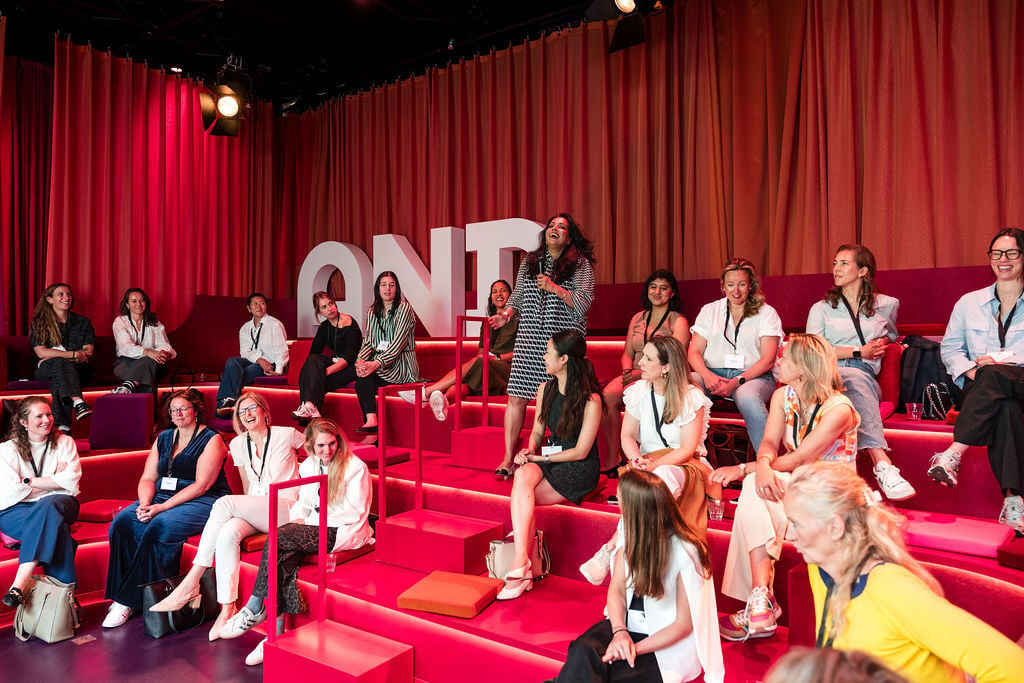Nieuws
AND She Leads: A Female Tech Leadership Event
15 juli 2025 • 3 min read

Highlights from Amsterdam, July 3, 2025
On July 3rd, more than 35 female leaders in tech gathered at Droog in Amsterdam for AND She Leads — a day of honest stories, sharp insights, and plenty of laughter. The event was brilliantly hosted by Artie Debidien, who created an inclusive space where everyone felt encouraged to join the conversation.
The programme combined big ideas with personal stories, exploring how women are shaping the future of tech — from programming languages to AI products and leadership in fast-moving times.
Beyond Code: The Human Element of Tech Leadership
Marloes Zwinkels, Managing Director of AND in Europe, opened the day by zooming out. With AI, data, and geopolitics rewriting the rules almost daily, she argued that leadership in tech isn’t about knowing everything — it’s about being adaptable and brave enough to figure things out on the fly.
She also shared findings from our latest “AND She Leads” study, which rated female leadership in Dutch tech at 6.9 out of 10. Meanwhile, the Netherlands has slipped in the World Economic Forum’s Global Gender Gap Index, reminding us progress on equality can stall if we’re not careful.
Key takeaways from Marloes’s talk:
- Adapt to thrive: The tech world moves too fast for static expertise. Leaders must evolve constantly.
- Build tech together: Inclusion isn’t a side note. A fair, human tech future needs all voices.
- Courage, creativity, compassion: These aren’t soft skills; they’re the ones that will truly shape tomorrow.
- Embrace complexity: Growth happens when we step into the unknown, not when we chase easy answers.
- Celebrate each other: Many women feel rewarded but not truly “successful.” We need to cheer loudly for each other’s wins.
Feminism & Programming Language Design
Felienne Hermans brought humour, history, and deep insight to her keynote. Programming, she reminded us, was once a field dominated by women — early “computers” were women, many of colour. But that flipped fast. Today, nearly all mainstream programming languages were created by Western men, shaping a largely masculine design culture.
Felienne, professor at VU Amsterdam and creator of the Hedy programming language, explored how this impacts not just who codes, but how coding itself is structured and taught. Drawing on feminist theory and Science and Technology Studies, she painted a compelling picture of what programming languages could look like if they were designed through more diverse lenses — and shared how Hedy is already trying to make that vision real.
It was a talk that left the room buzzing with new questions (and quite a few lightbulb moments). Here is a 10 min version of her talk, but without the experience being with Felienne in a room.
Building Effective AI: Products, Teams & Personal Growth
Our panel — featuring Wies Mensink (Albert Heijn), Lotte de Haas (KPN) and Brit Haarmans (TUI) — brought these big themes down to earth, sharing how gender dynamics play out in real AI projects, teams and careers.
Designing AI Products That Matter:
Forget shiny tech for tech’s sake. The panel championed a user-centric approach, building products that solve genuine problems for everyone, including employees. Diversity goes beyond gender or culture — it’s also personality, generation, perspective. Women, for instance, often shape more inclusive language and empathetic user experiences in conversational AI. Emerging roles like Conversational Analysts show how younger professionals are already steering these values.
Building Strong, Inclusive AI Teams:
Before any delivery magic happens, build the team right. That means clarifying skills and goals, and mixing backgrounds and thinking styles. The best teams thrive on trust, resilience, rhythm and a sense of belonging — not just individual brilliance. Leaders play a huge part by fostering psychological safety, offering honest feedback, and actively mentoring. It’s about finding the “right mix,” not simply hiring the “best.”
Personal Growth & Leadership:
Imposter syndrome? It’s practically a badge of honour. The panel stressed that titles might open doors, but real fulfilment comes from meaningful impact. Learning to say no, setting boundaries, and leaning on mentors, sponsors and allies all matter. They also called for empathy around challenges like maternity pressure, reminding us that flexibility and understanding build stronger teams, not weaker ones.
Let’s Keep the Conversation Going
We wrapped up inspired (and maybe a little impatient to change the world). Want to keep exploring how we can shape a more inclusive tech future together — or just catch the next invite?
👉 Follow AND Digital on LinkedIn.
And remember to celebrate your wins, lift others up, and keep asking: What kind of tech world are we building, and who are we building it for?


